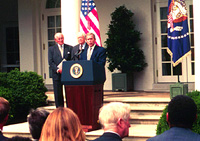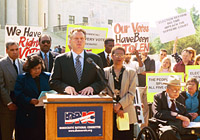Thirty Six Days of Uncertainty
Interested Groups
| Commissions and task forces have weighed in with various recommendations. |
 |
||
| President Bush accepted the report of the National Commission on Federal Election Reform from former President Carter and former House Minority Leader Robert Michel on July 31, 2001. |
| -Common
Cause Education Fund report "Not
Making the Grade: A State-by-State Report Card" (November 6, 2001).
-Election Reform Information Project report "One Year Later: What's Changed, What Hasn't and Why" (October 22, 2001). -U.C. Berkeley report "Counting All the Votes: The Performance of Voting Technology in the United States" (September 2001). -National Conference of State Legislatures task force report "Voting in America" (August 14, 2001). -Election Center task force report "Election 2000: Review and Recommendations by The Nation's Elections Administrators" (August 9, 2001). -Constitution Project report "Building Consensus for Election Reform" (August 2, 2001). -National Commission on Federal Election Reform report "To Assure Pride and Confidence in the Electoral Process" (July 31, 2001). -Caltech/MIT Voting Technology Project report "Voting - What Is, What Could Be" (mid-July 2001). -National Association of Counties/National Commission on Election Standards and Reform "Report and Recommendations to Improve America's Election System" (June 26, 2001). |
- The Century Foundation and the University of Virginia's Miller Center announced creation of a National Commission on Federal Election Reform, co-chaired by Howard Baker and Lloyd Cutler, on Jan. 30, 2001. Former presidents Jimmy Carter and Gerald Ford served as active honorary co-chairs; Robert H. Michel replaced Baker as a co-chair when Bush nominated him as Ambassador to Japan. The Commission held its first meeting on March 1 and held four public hearings (March 26, April 12, May 24, and June 5). It presented its final report, with thirteen policy recommendations, on July 31, 2001 in a ceremony in the Rose Garden at the White House: "To Assure Pride and Confidence in the Electoral Process."
- The National Conference of State Legislatures announced an Elections Reform Task Force on Dec. 15, 2000. The task force held six meetings around the country and issued a final report, "Voting in America," on August 14, 2001 during the organization's annual meeting. Its report contained 36 recommendations based on ten broad principles.
- The Constitution Project, a bipartisan nonprofit organization based at the Georgetown University Law Center, launched an Election Reform Initiative. Its Forum on Election Reform brought together more than 40 organizations; it released its report "Building Consensus for Election Reform" on August 2, 2001.
- The nonprofit Election Center established a task force which released its report "Election 2000: Review and Recommendations by The Nation's Elections Administrators" on August 9, 2001.
- MIT and Caltech announced a joint project to develop new voting technology on Dec. 14, 2000. The Caltech/MIT Voting Technology Project released its report "Voting - What Is, What Could Be" in mid-July 2001.
- The National Association of Counties (NACo) and the National Association of County Recorder, Election Officials and Clerks (NACRC) established a National Commission on Election Standards and Reform. The Commission held several meetings (Jan. 10., Jan. 31., March 2, April 21-22) and released its "Report and Recommendations to Improve America's Election System" on June 26, 2001. Following on the report, NACo launched an "Expand Democracy in America" campaign to encourage people to serve as poll workers and assist counties with voter education.
- The National Association of Secretaries of State (NASS) formed an Election Standards Task Force which held meetings on Jan. 13-14; task force recommendations served as the basis for a resolution adopted by NASS on Feb. 6, 2001 during its winter conference. Further steps were taken at the organization's summer conference, where NASS adopted a second resolution (July 17, 2001) focusing specifically on the role of the federal government and issued a best practices document (August 1, 2001).
- The Election Reform Information Project, at the University of Richmond, launched with a three-year, $3.57 million grant received from Pew Charitable Trusts in mid-March 2001. It issued a report "ONE YEAR LATER: What's Changed, What Hasn't and Why" (October 22, 2001) and launched a useful website: electionline.org.
- The League of Women Voters held a "Focus on the Voter" Election Reform Symposia Series: March 15, April 19, and May 22, 2001.
- The Democratic National Committee established a Voting Rights Institute, chaired by Maynard Jackson, "to address voter education and voter intimidation issues." The Voting Rights Institute, launched on May 1, 2001, seeks to use "education, training, grassroots advocacy, funding and communication to expand voting rights across America and at every level of government." The VRI held a Southern regional hearing in Riviera Beach, FL on May 7, an Eastern regional hearing in Newark, NJ on May 22, and a Midwestern regional seminar in Detroit, MI on June 29. A planned Western regional seminar was scrapped. The VRI helped develop materials emphasizing people's right to vote for the 2001 gubernatorial campaigns in New Jersey and Virginia.
- In January the American Civil Liberties Union filed lawsuits on behalf of African American voters in Georgia, Florida and Illinois; affiliates in Missouri and California have filed similar lawsuits; and in August the ACLU of Florida challenged several sections of the state's recently adopted Election Reform Act.
- Progressive groups are seeking to build support for a Voters' Bill of Rights. A cornerstone event was a Pro-Democracy Convention, sponsored by the Center for Constitutional Rights, held in Philadelphia June 29-July 1, 2001.
- The American Institute of Graphic Arts has created a voting design task force to serve as a nonpartisan, professional resource; the taskforce is part of a broader effort by the organization to encourage clearer communication between government and citizens.
 |
|
party's Voting Rights Institute on May 1 in front of the U.S. Supreme Court. |
Copyright 2000, 2001 Eric M. Appleman/Democracy in Action